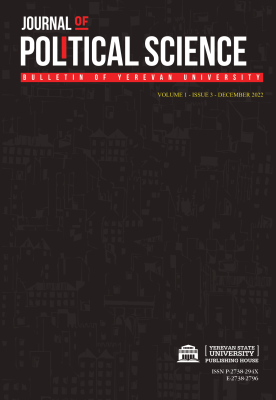The History of Imperial Politics and the Politics of Imperial History
DOI:
https://doi.org/10.46991/JOPS/2022.1.3.010Keywords:
Imperial politics, Imperial history, Ottoman Empire, Young Turk, Genocide, South Caucasus, Turkey, Armenia, nation-state, imperial paradigmAbstract
This article constitutes a discourse of the essence of the empire, and on ensuing contradictions in what otherwise had been a commonly experienced history by Turks and Armenians in the Ottoman Empire. This article is a moment of reflection on the author’s paradigm of empire, based on his academic research and diplomatic experience. The article addresses three questions: 1) What are empires and what are not, 2) Contradictions in the common history of Muslims/Turks and Armenians and possible explanations for these contradictions, 3) The fate of empires in international politics today.
The author’s empire paradigm to these three questions is motivated by two main considerations: (1) How can we explain the fundamental differences between the opposing histories of empires and peoples subject to empires? (2) On an intellectual and scientific level, how can we contribute to efforts that can move us closer to a more thorough history from which we could draw some lessons?
Historical discourse shows that differences will always remain, but even these differences should be aimed at enriching our knowledge and perspectives, and not at ignoring, obscuring or otherwise ignoring aspects of history itself. Contemporary interest in such comparative research goes beyond the methodologies that support the social sciences and the integrity of the profession of historian or other scholars of history.
References
Behm, Amanda. 2018. Imperial History and the Global Politics of Exclusion: Politics of Exclusion Britain, 1880-1940. Palgrave Macmillan, London. https://doi.org/10.1057/978-1-137-54850-4.
Burton, Antoinette. 1994. “Rules of thumb: British history and ‘imperial culture’ in nineteenth and twentieth-century Britain1.” Women’s History Review 3 (4): 483-501. https://doi.org/10.1080/09612029400200064.
Davutoğlu, Ahmet. 2014. “Turkish-Armenian relations in the process of de-Ottomanization or “de-historicization”: Is a “just memory” possible?” Turkish Policy Quarterly 13 (1): 21-30.
Drayton, Richard. 2011. “Where Does the World Historian Write From? Objectivity, Moral Conscience and the Past and Present of Imperialism.” Journal of Contemporary History 46 (3) 671-685. https://doi.org/10.1177/0022009411403519.
Howe, Stephen. 2009. Routledge Readers in History. Routledge.
Kennedy, Dane.2015. “The Imperial History Wars.” Journal of British Studies 54 (1): 5-22.
Kramer, Paul A. 2011. “Power and Connection: Imperial Histories of the United States in the World.” The American Historical Review 116 (5): 1348-1391.
Libaridian, Gerard J. 1999. The Challenge of Statehood: Armenian Political Thinking Since Independence. Blue Crane Books.
Libaridian, Gerard J. 2004. Modern Armenia: People, Nation, State. Routledge. https://doi.org/10.4324/9781315124667.
Libaridian, Gerard J. 2005. “The Past as a Prison, the Past as a Different Future.” Turkish Policy Quarterly 4 (4) (Winter).
Libaridian, Gerard J. 2011. “What Was Revolutionary about Armenian Revolutionary Parties in the Ottoman Empire?” In: A Question of Genocide: Armenians and Turks at the End of the Ottoman Empire, edited by Ronald Grigor Suny, Fatma Muge Gocek, and Norman M. Naimark, 82-112. Oxford University Press. https://doi.org/10.1093/acprof:osobl/9780195393743.003.0005.
Libaridian, Gerard J. 2013. “Erdoğan and His Armenian Problem.” Turkish Policy Quarterly 12 (1) (Spring): 43-64.
Libaridian, Gerard J. 2015. “Commentary on FM Davutoğlu’s TPQ Article on the Armenian Issue.” Accessed November 1, 2022. http://turkishpolicy.com/debate-article/1/commentary-on-fm-davutoglus-tpq-article-on-the-armenian-issue.
Pitts, Jennifer. 2012. “Political Theory of Empire and Imperialism: An Appendix.” In: Empire and Modern Political Thought, edited by Sankar Muthu, 351-388. Cambridge: Cambridge University Press. https://doi.org/10.1017/CBO9781139016285.014.
Price, Richard. 2006. “One Big Thing: Britain, Its Empire, and Their Imperial Culture.” Journal of British Studies 45 (3): 602-627.
Satia, Priya. 2022. “Britain’s Culture War: Disguising Imperial Politics as Historical Debate about Empire.” Journal of Genocide Research 24 (2): 308-320. https://doi.org/10.1080/14623528.2021.1968137.
Wallimann, Isidor, Michael N. Dobkowski, and Richard L. Rubenstein (eds). 1987. Genocide and the Modern Age: Etiology and Case Studies of Mass Death. New York: Greenwood Press.
Working, Lauren. 2020. The Making of an Imperial Polity: Civility and America in the Jacobean Metropolis. Cambridge: Cambridge University Press. https://doi.org/10.1017/9781108625227.
Downloads
Published
Issue
Section
License
Copyright (c) 2022 Gerard Libaridian

This work is licensed under a Creative Commons Attribution-NonCommercial 4.0 International License.



